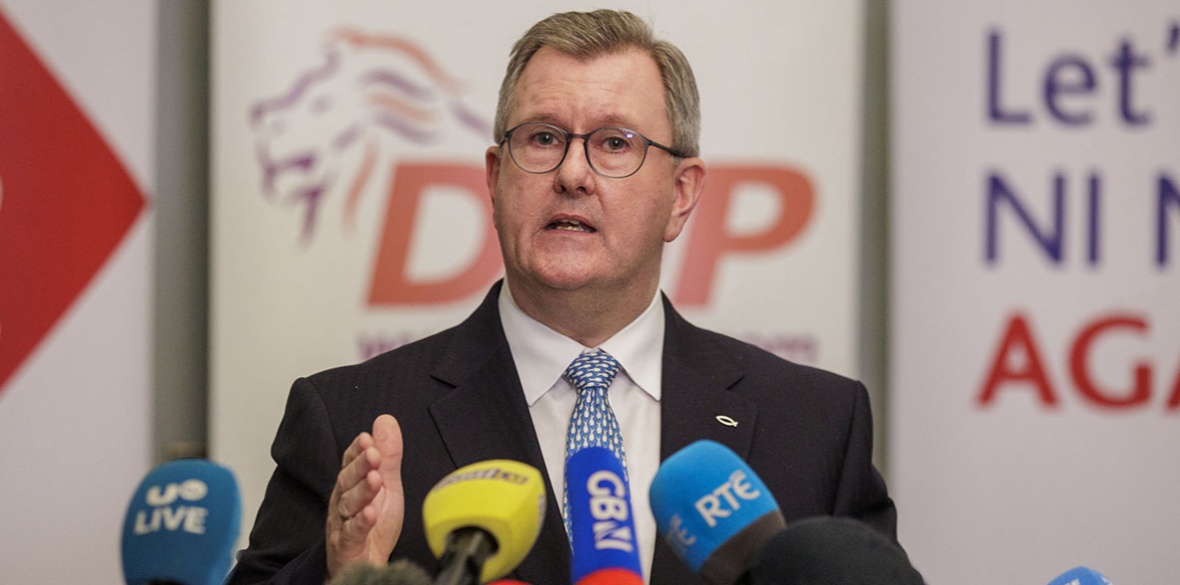This is the last article you can read this month
You can read more article this month
You can read more articles this month
Sorry your limit is up for this month
Reset on:
Please help support the Morning Star by subscribing here
THE Right Honourable Jeffrey Donaldson, knight of the imperial realm and leader of the largest of Ireland’s fractured unionist parties, got the dawn knock by the Police Service of Northern Ireland (PSNI) and half a day later was released after being charged with multiple historical sexual offences while his wife was charged with aiding and abetting additional offences.
To say that politics in Northern Ireland is enduring a deluge of social media speculation is to understate the state of affairs.
While the Democratic Unionist Party (DUP) doesn’t have a monopoly of religiosity in the pressure-cooker politics of what remains of Britain’s Irish colonial possession, the DUP has uniquely made scripture the soundtrack to its narrative.
While the defrocked DUP leader faces one charge of rape, one of gross indecency and several counts of indecent assault, the PSNI has warned that speculation “may have a negative impact on the criminal justice process.” The laws around the reporting of cases involving allegations of sexual offending include full and continuing anonymity for victims unless they choose to waive that right.
Nevertheless, speculation about the political consequences is unconstrained.
Donaldson has disturbed some in his party with what is a transparent volte-face over the veto the DUP has exercised over the reconvening of the Stormont Assembly after Sinn Fein emerged two seats ahead in the last elections.
Northern Ireland was set up a century ago as a statelet with political power entrusted to the unionists in the largest portion of Ireland where an electoral majority for a continued union with Great Britain could be guaranteed.
That guarantee has dissolved, along with a new Catholic majority, increased nationalist and republican sentiment and the growth of the mostly middle-class Alliance Party which declines either appellation.
Where once “big house” bourgeois unionism dominated — represented by its traditional party, the Ulster Unionists — this has declined. The DUP — built around the personality, politics and prescriptive strictures of the late Ian Paisley and with a rural farming and Protestant working-class base, took its place.
Under the Good Friday Agreement, the largest party self-described as unionist or nationalist takes the office of first minister or deputy first minister.
So, traumatised by Sinn Fein’s advance, the DUP refused — as it is able under the GFA — to allow Stormont to assemble and in the interim local government gradually ground to a DUP-induced stasis.
There is some degree of overlap in DUP support between Protestant fundamentalists and political opponents of Donaldson’s accommodation with the border arrangements that Boris Johnson agreed with the EU — and so this may disrupt the renewal of power-sharing arrangements. DUP electoral support frays where the Traditional Unionist Voice fringe makes a bid for this declining constituency.
The DUP’s pretensions to a moral authority will take a hit with the inevitable court proceedings.
Nevertheless, the realpolitik foundations of power in Northern Ireland remain undisturbed, even strengthened, in the face of the DUP’s possible marginalisation.
The British government holds the purse strings, commands the coercive power of the state, holds the power to allow a border poll and exercises, along with the EU, effective power over trading arrangements plus a constitutional veto over Stormont’s weakened powers.
This moment is yet another stage in the decay of the unionist project but not yet a decisive stage in the struggle for Irish national unity.
While the immediate ambitions of Sinn Fein, increasingly happy in its accommodation with the imperial powers of Britain, the EU and the US, is satisfied with the comforts of office, this should be the time Labour abandons its imperial mindset over Irish unity.












